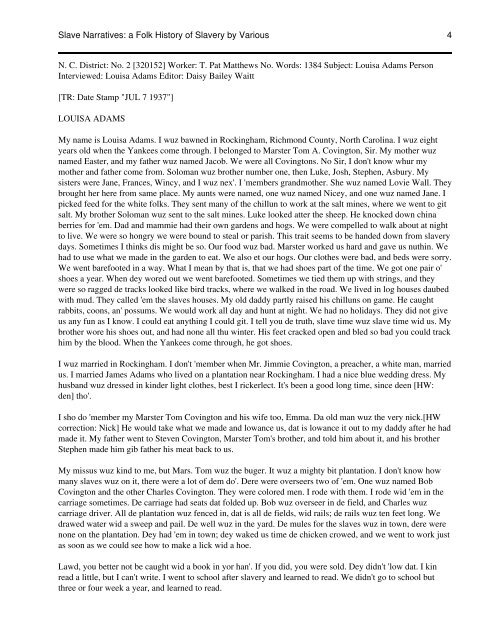Slave Narratives: a Folk History of Slavery in the United States
Slave Narratives: a Folk History of Slavery in the United States
Slave Narratives: a Folk History of Slavery in the United States
Create successful ePaper yourself
Turn your PDF publications into a flip-book with our unique Google optimized e-Paper software.
<strong>Slave</strong> <strong>Narratives</strong>: a <strong>Folk</strong> <strong>History</strong> <strong>of</strong> <strong>Slave</strong>ry by Various 4N. C. District: No. 2 [320152] Worker: T. Pat Mat<strong>the</strong>ws No. Words: 1384 Subject: Louisa Adams PersonInterviewed: Louisa Adams Editor: Daisy Bailey Waitt[TR: Date Stamp "JUL 7 1937"]LOUISA ADAMSMy name is Louisa Adams. I wuz bawned <strong>in</strong> Rock<strong>in</strong>gham, Richmond County, North Carol<strong>in</strong>a. I wuz eightyears old when <strong>the</strong> Yankees come through. I belonged to Marster Tom A. Cov<strong>in</strong>gton, Sir. My mo<strong>the</strong>r wuznamed Easter, and my fa<strong>the</strong>r wuz named Jacob. We were all Cov<strong>in</strong>gtons. No Sir, I don't know whur mymo<strong>the</strong>r and fa<strong>the</strong>r come from. Soloman wuz bro<strong>the</strong>r number one, <strong>the</strong>n Luke, Josh, Stephen, Asbury. Mysisters were Jane, Frances, W<strong>in</strong>cy, and I wuz nex'. I 'members grandmo<strong>the</strong>r. She wuz named Lovie Wall. Theybrought her here from same place. My aunts were named, one wuz named Nicey, and one wuz named Jane. Ipicked feed for <strong>the</strong> white folks. They sent many <strong>of</strong> <strong>the</strong> chillun to work at <strong>the</strong> salt m<strong>in</strong>es, where we went to gitsalt. My bro<strong>the</strong>r Soloman wuz sent to <strong>the</strong> salt m<strong>in</strong>es. Luke looked atter <strong>the</strong> sheep. He knocked down ch<strong>in</strong>aberries for 'em. Dad and mammie had <strong>the</strong>ir own gardens and hogs. We were compelled to walk about at nightto live. We were so hongry we were bound to steal or parish. This trait seems to be handed down from slaverydays. Sometimes I th<strong>in</strong>ks dis might be so. Our food wuz bad. Marster worked us hard and gave us nuth<strong>in</strong>. Wehad to use what we made <strong>in</strong> <strong>the</strong> garden to eat. We also et our hogs. Our clo<strong>the</strong>s were bad, and beds were sorry.We went barefooted <strong>in</strong> a way. What I mean by that is, that we had shoes part <strong>of</strong> <strong>the</strong> time. We got one pair o'shoes a year. When dey wored out we went barefooted. Sometimes we tied <strong>the</strong>m up with str<strong>in</strong>gs, and <strong>the</strong>ywere so ragged de tracks looked like bird tracks, where we walked <strong>in</strong> <strong>the</strong> road. We lived <strong>in</strong> log houses daubedwith mud. They called 'em <strong>the</strong> slaves houses. My old daddy partly raised his chilluns on game. He caughtrabbits, coons, an' possums. We would work all day and hunt at night. We had no holidays. They did not giveus any fun as I know. I could eat anyth<strong>in</strong>g I could git. I tell you de truth, slave time wuz slave time wid us. Mybro<strong>the</strong>r wore his shoes out, and had none all thu w<strong>in</strong>ter. His feet cracked open and bled so bad you could trackhim by <strong>the</strong> blood. When <strong>the</strong> Yankees come through, he got shoes.I wuz married <strong>in</strong> Rock<strong>in</strong>gham. I don't 'member when Mr. Jimmie Cov<strong>in</strong>gton, a preacher, a white man, marriedus. I married James Adams who lived on a plantation near Rock<strong>in</strong>gham. I had a nice blue wedd<strong>in</strong>g dress. Myhusband wuz dressed <strong>in</strong> k<strong>in</strong>der light clo<strong>the</strong>s, best I rickerlect. It's been a good long time, s<strong>in</strong>ce deen [HW:den] tho'.I sho do 'member my Marster Tom Cov<strong>in</strong>gton and his wife too, Emma. Da old man wuz <strong>the</strong> very nick.[HWcorrection: Nick] He would take what we made and lowance us, dat is lowance it out to my daddy after he hadmade it. My fa<strong>the</strong>r went to Steven Cov<strong>in</strong>gton, Marster Tom's bro<strong>the</strong>r, and told him about it, and his bro<strong>the</strong>rStephen made him gib fa<strong>the</strong>r his meat back to us.My missus wuz k<strong>in</strong>d to me, but Mars. Tom wuz <strong>the</strong> buger. It wuz a mighty bit plantation. I don't know howmany slaves wuz on it, <strong>the</strong>re were a lot <strong>of</strong> dem do'. Dere were overseers two <strong>of</strong> 'em. One wuz named BobCov<strong>in</strong>gton and <strong>the</strong> o<strong>the</strong>r Charles Cov<strong>in</strong>gton. They were colored men. I rode with <strong>the</strong>m. I rode wid 'em <strong>in</strong> <strong>the</strong>carriage sometimes. De carriage had seats dat folded up. Bob wuz overseer <strong>in</strong> de field, and Charles wuzcarriage driver. All de plantation wuz fenced <strong>in</strong>, dat is all de fields, wid rails; de rails wuz ten feet long. Wedrawed water wid a sweep and pail. De well wuz <strong>in</strong> <strong>the</strong> yard. De mules for <strong>the</strong> slaves wuz <strong>in</strong> town, dere werenone on <strong>the</strong> plantation. Dey had 'em <strong>in</strong> town; dey waked us time de chicken crowed, and we went to work justas soon as we could see how to make a lick wid a hoe.Lawd, you better not be caught wid a book <strong>in</strong> yor han'. If you did, you were sold. Dey didn't 'low dat. I k<strong>in</strong>read a little, but I can't write. I went to school after slavery and learned to read. We didn't go to school butthree or four week a year, and learned to read.
















